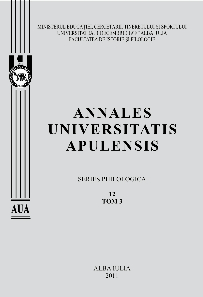The Romanian Contemporary Theatre in the European Cultural Context
The Romanian Contemporary Theatre in the European Cultural Context
Author(s): IOLANDA MănescuSubject(s): Literary Texts
Published by: Universitatea »1 Decembrie 1918« Alba Iulia
Keywords: theatre; contemporary; playwriting; director; culture; Romanian
Summary/Abstract: The political background is decisive in what regards the cultural tendencies, whereas culture represents one of the most important means of uniting the European peoples. Multiculturalism is one of the main aims of the contemporary society and therefore it has an important influence also on the theatrical developments, since this art form is in a more direct contact with its audiences than any other. The mass communication expansion also has a determinative role in the theatre’s evolution nowadays. At the turn of the century, in the context of the dramatic end of the cold war, theatre turned to the ancient masterpieces and to the classics as to the fundamental values of humanity. Even today, the most acclaimed and important performances are of the classics’ plays, even if they are treated in a contemporary key. The Romanian contemporary theatre includes both playwrights and directors who are renowned all over the world if we are to mention only some of them, like Eugene Ionesco or Matei Visniec and Liviu Ciulei, Andrei Serban or Silviu Purcarete. Their artistic careers began in Romania but they became famous especially after they started to live and work abroad. While Eugene Ionesco intended to visit Romania after December 1989 but did not do it eventually, Matei Visniec has become a regular presence here, if we are to refer to the playwrights. In their turn, the directors Liviu Ciulei, Andrei Serban and Silviu Purcarete stage their performances both internationally and nationally. The trend of globalization of cultural activities is materialized in an increasing number of theatre festivals which have developed equally in our country and all over Europe. The most important theatre festivals in Romania are the National Theatre Festival that takes place in Bucharest, the festival of Sibiu and, last but not least, the International Shakespeare Festival founded in Craiova. Moreover, there is a rather new tendency of establishing theatrical associations and festival networks. The theatres often invite directors or whole creative teams including set and costume designers, composers or light designers from Romania or from abroad and devise projects which include both the performance productions and the organization of international tours. Thus, the Romanian culture, and especially theatre represent a vivid, complex and powerful means of including our cultural identity within the European context.
Journal: Annales Universitatis Apulensis. Series Philologica
- Issue Year: 12/2011
- Issue No: 2
- Page Range: 7-17
- Page Count: 10
- Language: English

